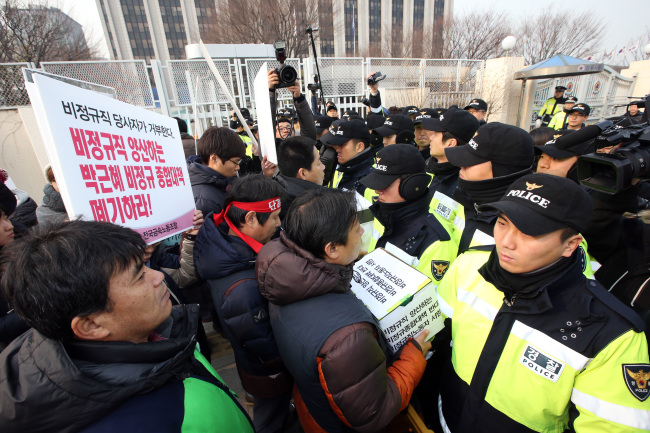Korea pushes to improve working conditions for nonregular employees
By Kim Yon-sePublished : Dec. 29, 2014 - 22:01
The Korean government said Monday it was considering a set of plans aimed at improving working conditions and addressing the limited welfare provisions for irregular and subcontract workers.
Under the plan, irregular workers would be allowed to get severance pay after working for three months, and those aged 35 or older could work for up to four years at the same workplace, the Ministry of Employment and Labor said.
As current labor rules stipulate that the severance pay is available for nonregular employees who work for a company for one year or more, the revised labor policy to protect temporary workers is expected to spark opposition from the business sector.
The ministry brought its plan to the Korea Tripartite Commission encompassing labor, management and government, laying out its initiatives to improve the labor conditions of nonregular workers in 2015.
The ministry estimated that about 1.95 million people, who were dismissed after working for firms for less than one year, could benefit from the revised rules.
Under the plan, irregular workers would be allowed to get severance pay after working for three months, and those aged 35 or older could work for up to four years at the same workplace, the Ministry of Employment and Labor said.
As current labor rules stipulate that the severance pay is available for nonregular employees who work for a company for one year or more, the revised labor policy to protect temporary workers is expected to spark opposition from the business sector.
The ministry brought its plan to the Korea Tripartite Commission encompassing labor, management and government, laying out its initiatives to improve the labor conditions of nonregular workers in 2015.
The ministry estimated that about 1.95 million people, who were dismissed after working for firms for less than one year, could benefit from the revised rules.

Employers, however, are expected to argue that they will not accept any retroactive rules, citing the implementation date of Jan. 1. The proposal must be approved by the tripartite commission.
In addition, the ministry will push to extend the work spans for temporary employees.
While nonregular employees older than 35 can work for a firm for up to two years, the revised proposal entitles them to work for up to four years, regardless of whether or not the management gives them a regular position.
Further, when nonregular workers fail to gain regular worker status, they will be paid additionally, apart from the severance pay, when their contracts expire, according to the policy proposal. The additional amount will come to 10 percent of the monthly wage.
Right after the unveiling from the ministry, a group of labor advocates staged a rally against the policy. They claimed the Park Geun-hye administration’s low-key purpose was aimed at increasing the number of temporary jobs.
“The working-period extension from two years to four years for nonregular employees would provide employers with a wider opportunity to dismiss them, as it will be more difficult for the workers to gain regular worker status in their position,” the labor lobby said in a statement.
The Korea Employers Federation, a management lobby, also opposed the policy, arguing that it would be difficult for the nation to improve contract workers’ labor conditions without revising the high-level wage hikes for regular employees.
Over the past few years, wage hikes in the business sector were made in favor of regular workers. Though the average wage for regular employees rose 2.3 percent on-year in 2014, the wage for contract workers inched up 1.8 percent, data from Statistics Korea showed.
The average monthly wage for contract workers increased just 25,000 won from a year before to stand at 1.45 million won, about 55 percent of that of regular workers.
The level is quite low compared to other members of the Organization for Economic Cooperation and Development, where wages for nonregular workers in major countries now amount to 70 percent of those of regular workers on average.
By Kim Yon-se (kys@heraldcorp.com)








![[Graphic News] More Koreans say they plan long-distance trips this year](http://res.heraldm.com/phpwas/restmb_idxmake.php?idx=644&simg=/content/image/2024/04/17/20240417050828_0.gif&u=)
![[KH Explains] Hyundai's full hybrid edge to pay off amid slow transition to pure EVs](http://res.heraldm.com/phpwas/restmb_idxmake.php?idx=644&simg=/content/image/2024/04/18/20240418050645_0.jpg&u=20240419100350)





![[From the Scene] Monks, Buddhists hail return of remains of Buddhas](http://res.heraldm.com/phpwas/restmb_idxmake.php?idx=652&simg=/content/image/2024/04/19/20240419050617_0.jpg&u=20240419175937)

![[KH Explains] Hyundai's full hybrid edge to pay off amid slow transition to pure EVs](http://res.heraldm.com/phpwas/restmb_idxmake.php?idx=652&simg=/content/image/2024/04/18/20240418050645_0.jpg&u=20240419100350)

![[Today’s K-pop] Illit drops debut single remix](http://res.heraldm.com/phpwas/restmb_idxmake.php?idx=642&simg=/content/image/2024/04/19/20240419050612_0.jpg&u=)